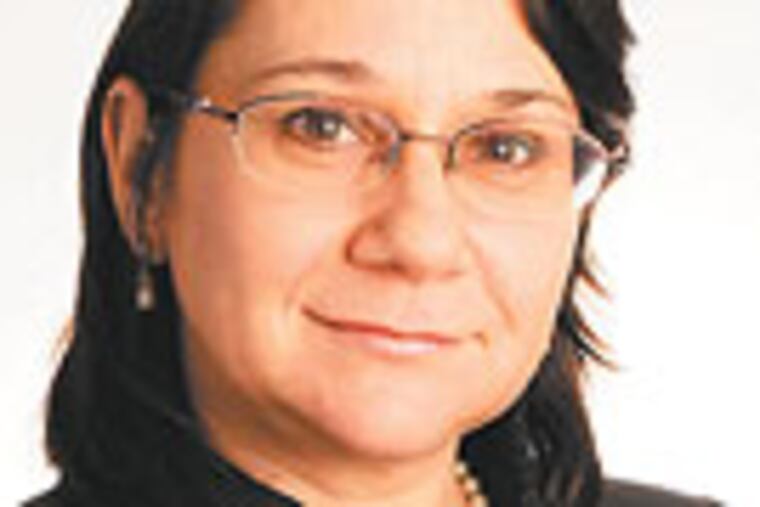Law Review: Dechert cushions downturn with Russian branch
Laura Brank wanted to do something different growing up in suburban Connecticut, so she told her parents one day she would enlist and earn her undergraduate degree overseas while serving in the Army, instead of taking the traditional route and going straight to college.

Laura Brank wanted to do something different growing up in suburban Connecticut, so she told her parents one day she would enlist and earn her undergraduate degree overseas while serving in the Army, instead of taking the traditional route and going straight to college.
Her parents were not pleased.
But Brank was undeterred. She followed through on her plan and, while in the Army, earned her degree in Eastern European studies at the Munich campus of the University of Maryland, which serves diplomatic and military personnel overseas.
Later, she studied Russian at a military language school in Monterey, Calif., served for a time in military intelligence, then earned a law degree from Georgetown in 1991.
Her career has been similarly outside the conventional box ever since.
Brank is now managing partner of Philadelphia-based Dechert L.L.P.'s growing office in Moscow. Despite the global economic crunch, Russia is a hot market, and her practice is all about doing deals, all the better to cushion Dechert from ongoing weakness in Wall Street transactional work, the firm's longtime forte.
In the last few years, Brank has advised General Motors on a $350 million joint venture with AvtoVAZ OAO, Russia's largest automotive manufacturer, Daimler AG on a $250 million acquisition of a 10 percent stake in a Russian truck manufacturer, and PepsiCo Inc. and Pepsi Bottling Group Inc. on their $1.4 billion acquisition of a Russian fruit-juice-maker, among other deals.
She must have one of the world's longest commutes.
Brank lives in London with her husband, William Pease, a novelist and former Justice Department prosecutor, and their two sons, ages 12 and 9.
But two weeks a month, she is in Moscow running Dechert's office there.
Last year, Brank was lured away from Chadbourne & Parke L.L.P., a New York law firm, when a recruiter called with an appealing idea: Dechert was looking to open an office in Moscow. Would she have any interest in being its managing partner and helping Dechert establish a toehold in Russia?
At the time, Brank was talking to other firms with offices in Moscow. But the idea of starting with a blank slate was a powerful lure.
"It was a great challenge to start anew and build my own team and our own practice without any lingering problems," she said.
She left Chadbourne with Shane DeBeer, a corporate and securities lawyer. The two graduated from Georgetown together and have been working in tandem ever since.
The Moscow office, opened last year, is central to Dechert's strategy. The country is flush and has relatively little debt, the deals are big, and to some extent the Russian economy has been insulated from the financial shocks that began pounding the West in 2008.
"It is a huge market, a growing market," Brank said in an interview at Dechert's headquarters in the Cira Centre in University City. "Brand-new shopping malls . . . everything is new. There are 12 million people there [in Moscow], and there is a burgeoning middle class."
But there's a catch for firms fighting to establish themselves in Moscow: Lawyers who both know how to work the Russian system and are fluent in English and familiar with the legal systems in the United Kingdom and the United States are in short supply, so competition for local lawyers is fierce.
And firms tend to poach from one another, as Dechert did in recruiting Brank.
Dechert made a big score earlier this month, announcing that it had recruited Ivan Marisin, a top litigator, for its dispute-resolution practice in Russia and central Europe.
What made Marisin's move particularly important for Dechert managers was that he had been recruited from Clifford Chance L.L.P., one of London's "magic circle" firms, known for their global reach and ability to charge high rates.
For Dechert, playing in that arena signals an arrival of sorts.
One of Brank's reasons for jumping to Dechert says a lot about the global marketplace for lawyers these days:
It wasn't about the work. She had plenty of that, churning out one deal after another in the hot Russian market.
But Brank says that as the deals became more complex, her need for support from Chadbourne's transactional lawyers, its securities team, and others grew beyond what Chadbourne could deliver.
Dechert, on the other hand, had thriving offices in New York and London, where many of the deals are done, and an office in Brussels, Belgium, the seat of the European Union and the continent's regulatory center.
Brank says practicing law in Russia requires not only high-level legal skills but also a level of personal service that has disappeared from the practice of law in the West.
While she was visiting the United States a few weeks ago, a Russian client asked her to check on some artwork he had just bought in the States. He wanted her to review the sales contract and make sure the pieces were shipped properly.
"It's sort of like winding back the clock to 50 years ago in the United States, when you came to your lawyer, and your lawyer took care of everything for you," she said.
For entrepreneurial lawyers like Brank, that's an ideal setting.